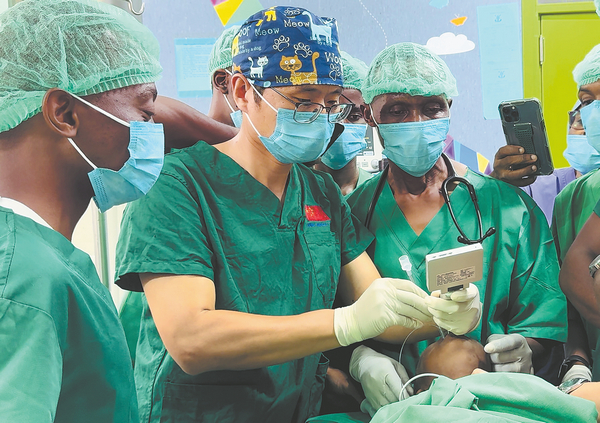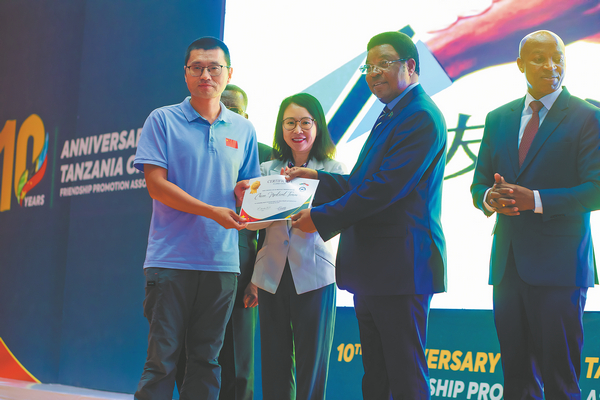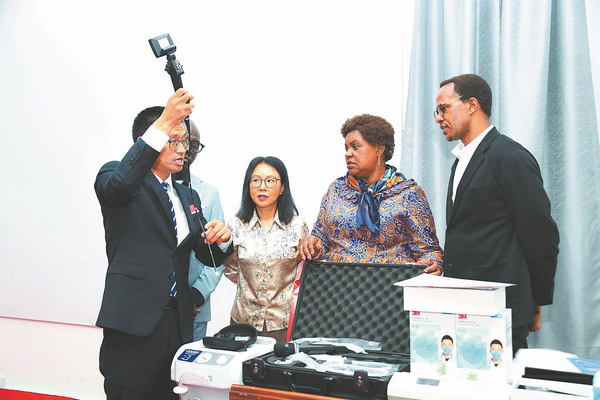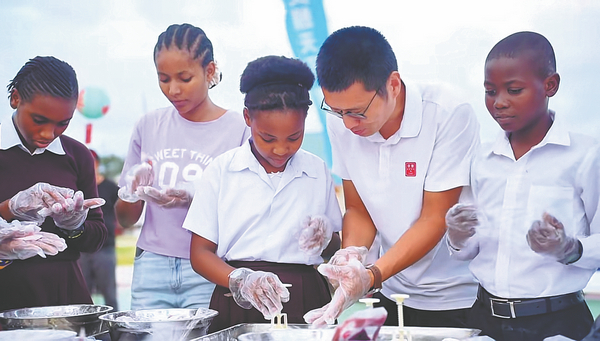
As the leader of the 27th Chinese medical team in Tanzania, Zhang (center) teaches doctors how to use visual medical equipment. CHINA DAILY
On the streets of Dar es Salaam, Chinese doctor Zhang Junqiao does what the Tanzanians do. He plays soccer with teenagers, runs marathons during his spare time, and enjoys the views on the way to the hospital he works at some 7 kilometers from his home.
The 38-year-old anesthesiologist from Shandong Second Medical University in Weifang, Shandong province, is the leader of the 27th Chinese medical team in Tanzania, and has spent more than a year providing medical assistance, not only saving lives but also building bridges between cultures through his dedication and compassion.
For Zhang, healing extends beyond the operating room. He has immersed himself in Tanzanian life, learning useful phrases, visiting an orphanage, and donating blood to help address chronic shortages.
"To truly help, you must become part of the community," he says. "When I greet people — even if I mix up words like 'eyes' and 'mouth' — their faces light up. It's like when foreigners try Chinese; the effort builds trust."
Tanzania's healthcare system, while better than in many African nations, still faces significant challenges. Zhang compares it to that of a county-level hospital in China — functional but lacking advanced equipment and resources.
"The basic conditions are there, but things like disposable medical supplies and high-end anesthesia tools are scarce," he says.
One of the contributions by his medical team was a donation of visual anesthesia technology, including video laryngoscopes and bronchoscopes, to the anesthesiology department of Dar es Salaam's Muhimbili National Hospital in November.
"Before, difficult airway cases posed a major risk — patients couldn't be intubated, leading to life-threatening situations. Now, with these tools, we can solve problems that were once impossible here," the doctor adds.

Zhang (left) receives a formal commendation from Prime Minister Kassim Majaliwa (second from right) for the outstanding support and partnership of Chinese medical teams in the field of health and medical care over the past 10 years at the celebration ceremony of the 10-year anniversary of Tanzania China Friendship Promotion Association in November 2024. CHINA DAILY
Arriving in Tanzania in January 2024, Zhang prioritized training doctors in advanced techniques like video laryngoscopy to reduce risks from anesthesia. "True aid isn't just giving someone a fish but teaching them to fish," he says.
According to a statement from the hospital, the equipment will aid the anesthesiology department in transitioning from broad to precision techniques, and the video laryngoscopes are "a timely help" that will enhance patient safety during anesthesia, and address a persistent challenge the department faced.
Despite issues such as limited resources and cultural differences, Zhang has adapted quickly. "You can't change a system overnight, but you can save one life at a time," he says.
Among the many patients he has helped is an 8-year-old boy, who was diagnosed with a severe abdominal wall hernia. The boy developed a special bond with the Chinese medical team, who gave him the Chinese name of Qilu.
Qilu is a reference to the kingdoms of the Qi and Lu in what is now Shandong before the founding of the Qin Dynasty (221-206 BC). It is sometimes used as a name for the province, one of the birthplaces of Chinese culture and civilization.
The boy's family, unable to afford treatment, was on the verge of despair until the Chinese medical team stepped in and arranged for surgery at the Muhimbili National Hospital, pooling their resources to cover the medical expenses. After the boy recovered, his mother asked the team to give him a Chinese name as a way of honoring their kindness.
Moved by her sincerity, Zhang named him Qilu, after the place from where all the team members come. "We hope this name symbolizes the unbreakable bond between China and Tanzania," Zhang says.

Zhang Junqiao (left) demonstrates visual anesthesia equipment at a donation ceremony to the Ministry of Health in Tanzania last year. CHINA DAILY
In November last year, Tanzania's Prime Minister Kassim Majaliwa honored China's medical team with a formal commendation for its outstanding support and partnership in the field of health and medical care over the past 10 years. "Saving lives is why we come. It's a doctor's duty," Zhang said at the 60th-anniversary celebration of diplomatic relations between China and Tanzania.
To commemorate April 7, World Health Day, he and other 12 members from the three Chinese medical teams in Tanzania organized a two-day mobile free clinic in the northern city of Arusha.
George Nsoke, leader of the Ngorongoro Conservation Area Authority medical center, says that the Chinese medics addressed long-standing shortages by sharing medical expertise and donating much-needed medicines and equipment.
Zhang says that the mobile clinic allowed the medical teams to extend their expertise and support to more regions in Tanzania to the benefit of more people.
Long before his mission, Zhang had already hit national headlines in China as the founder of Xintiao Xingdong (the Heartbeat Initiative), a nationwide campaign to teach the public first-aid skills and cardiopulmonary resuscitation, an emergency lifesaving procedure performed when the heart stops beating.

The 38-year-old doctor visits a school in Dar es Salaam in Tanzania. CHINA DAILY
What began as a humble street stall initiative in 2020 — during which Zhang knelt on sidewalks in Weifang to demonstrate chest compressions — soon grew into a movement involving hundreds of medical professionals in 20 cities.
His efforts earned him widespread acclaim, including a nomination for the "Good Doctor of China", a prestigious honor recognizing medical professionals who go above and beyond in serving public health. He has also taken the program to Chinese companies in Tanzania during his two-year medical aid mission.
Since 1963, when China dispatched its first medical team to Algeria, about 25,000 Chinese medical workers have been sent to Africa, where they had treated some 230 million patients by the end of 2023, according to statistics from the National Health Commission.
Shandong Second Medical University has played an important role in this mission. Over four decades, it has sent 23 medical professionals to countries like Tanzania, the Seychelles and Tonga, overcoming hardships to deliver care and share expertise.
In reference to the devotion of generations of doctors and nurses who have offered a helping hand to Africa, Zhang says: "We carry the torch of our predecessors and the weight of their expectations."
Contact the writer at wangqian@chinadaily.com.cn